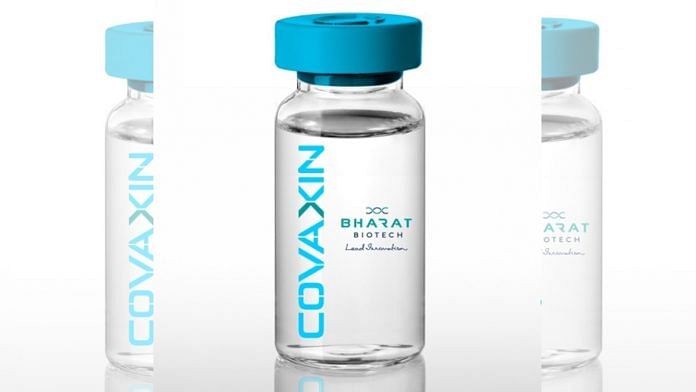New Delhi: The Phase 2 clinical trials of Covaxin — the indigenous Covid-19 vaccine developed through a partnership between the Indian Council of Medical Research (ICMR) and Bharat Biotech — show that the vaccine is safe with no serious adverse events being reported.
“In the phase 2 trial, BBV152 (the Covaxin) led to tolerable safety outcomes and enhanced humoral and cell-mediated immune responses,” said the Phase 2 study, which is yet to be peer-reviewed.
It also noted that “it is hypothesised that the humoral and cell-mediated responses reported in this study may persist until at least 6-12 months after the second vaccination dose.”
While humoral immune response is mediated by antibodies produced by B-cells, the cell-mediated immune response is mediated by T-cells and does not involve antibodies. T-cells and B-cells are components of the adaptive immune system whose roles are to kill infected host cells among other functions.
Researchers, however, said evaluation of safety outcomes required extensive phase 3 clinical trials.
Also read: Govt looks into new vaccine data after Pfizer, Bharat Biotech, SII seek emergency use approval
Trial conducted to determine seroconversion
The second phase of the trial was conducted with the specific motive to check immunogenicity, i.e., the ability of a foreign substance to provoke an immune response and the safety of the two vaccine formulations that had been selected in the first phase.
The trial involved “380 healthy children and adults”. Half of the participants received 3 microgram of the antigen along with the adjuvant, while the other half received twice the dose of antigen and adjuvant.
Like the first phase of the study, phase 2 was double-blinded and randomised, i.e., neither the participants nor the researchers were aware of which formulation was being administered to whom.
The goal was to determine and compare the seroconversion, which is the number of participants who develop antibodies, among the two groups.
The study noted that the researchers had assumed that they “would observe seroconversion rates of 85% for” the 3 microgram formulation and 95% for the 6 microgram formulation.
‘Majority of adverse events mild’
The trial found that the “seroconversion rates of neutralising antibodies on day 56 were 92.9% and 98.3% in the 3 µg and 6 µg”, respectively.
“Solicited local adverse events included pain at the injection site and swelling, and systemic adverse events included fever, fatigue/malaise, myalgia, body aches, headache, nausea/vomiting, anorexia, chills, generalised rash, and diarrhoea,” the study noted.
But it also highlighted that “the majority of adverse events were mild and resolved within 24 hours of onset”.
Also read: ‘How do we get there?’ – Bharat Biotech readies for uphill task of Covid vaccine roll out



